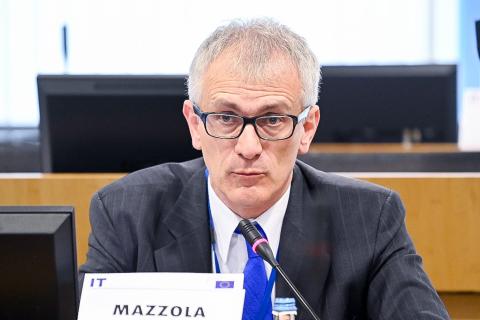European Economic
and Social Committee
Constant changes in national political priorities are jeopardising the completion of the trans-European transport network by 2030, warns EESC
The European Economic and Social Committee (EESC) says that completing key EU transport corridors is vital, but that obstacles persist at national level which could be largely overcome by involving civil society organisations early on.
Constant changes in the EU Member States' domestic political priorities are a fundamental obstacle to achieving timely implementation of the trans-European transport network (TEN-T) projects, and this raises doubts as to whether it will be possible to complete the Core Network by 2030. The warning comes from Alberto Mazzola's information report on the Evaluation of the Trans-European Network – Transport (TEN-T) guidelines 2013-2020, adopted at the EESC July plenary session.
The main barriers to completing the TEN-T projects include not just changes in national political priorities, affecting projects with cross-border significance in particular, but also opposition from citizens and other stakeholders. This shows that there are important social and economic issues related to TEN‑T policies where civil society needs must be addressed, because only if civil society organisations are involved and consulted early on can proper follow-up be carried out and the blocks to the project's implementation be removed.
During the plenary debate, Mr Mazzola said: We share stakeholders' doubts as to whether the Core Network can be completed by 2030, but we consider this target to be important in order to push Member States to work harder and that several major cross-border projects could be completed by that date. Civil society participation and monitoring of corridor and project development are fundamental to implement the projects in the most appropriate way. Where this has been carried out at an early stage with widespread information campaigns, the projects are advancing quite well, while where this has not been done there is strong resistance from parts of the population
.
One issue concerning TEN-T infrastructure is maintenance: the need for maintenance has been greatly underestimated in several countries, where it is now emerging as a serious problem, while in others it has been properly carried out. In this respect, the EESC calls for urgent national plans for ordinary and extraordinary maintenance funding and believes a European core network monitoring plan would be appropriate.
With regard to territorial cohesion, the EESC considers that Core Network Corridors have to be better linked to the regional, urban and local dimensions. To be in line with the European Commission's new geopolitical objectives, they also need to be better interconnected with the rest of the world, both for goods and for passengers, and to this end and as a matter of priority a forum including neighbouring countries should be set up.
The trans-European transport network is key for free movement of people and goods in the EU, which is one of the fundamental freedoms. Sustainable, competitive, reliable, free-flowing, profitable transport is a pre-condition for European prosperity, including and especially in the current pandemic. The TEN-T programme has been designed to help close gaps, remove bottlenecks and eliminate the technical and administrative barriers that exist between the national transport networks of each EU Member State.
The policy evaluation for 2013-2020 was performed at the request of the Commission and focuses on the achievements and goals of the TEN-T policy and on how it contributes to better transport infrastructure, smoother traffic flow, reduced congestion and thus a more efficient public transport system, and job creation.
In order to evaluate the progress and the impact of the network, the Committee undertook five major fact-finding missions, to Italy, Poland, Romania, Sweden and Austria, and visited three Core Corridor construction sites associated with the most relevant cross-border projects. The missions included meetings with representatives of national and local authorities, employers, workers and civil society organisations.
In addition, an online questionnaire was published in order to examine the views of civil society organisations on the development of the TEN-T projects and their perception of the projects' relevance, effectiveness, inclusion of civil society and European added value, with a view also to the future development of TEN-T policy. The questionnaire was distributed to local organisations based in Sweden, Romania, Italy, Poland, Austria and France.
